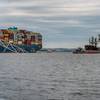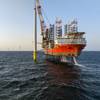According to reports, China strives to become the world's largest shipbuilder.
Last year China maintained its position as the world's third-biggest shipbuilder, a rank it has held for 12 consecutive years, as ship export volume surged 74 percent to $8.11b.
Two leading domestic shipbuilders, Dalian Shipbuilding Industry Co Ltd and Shanghai Waigaoqiao Shipbuilding Co Ltd, became world top-10 shipbuilders, joining a list that was before the sole domain of Japanese and South Korean companies.
Chinese shipbuilders produced 14.52 million deadweight tons last year, nearly 20 percent of the world's total, compared to only 6 percent of the global market in 2000.
Their profitability has also improved. The industry's total profits doubled last year to reach a record high of 9.6 billion yuan, more than the combined profits of the previous five years, according to figures from the Commission of Science Technology and Industry for National Defence, the government agency in charge of the shipbuilding industry.
Types of made-in-China ships have developed from conventional bulk carriers and crude oil tankers into high value and sophisticated vessels, such as very large crude carriers (VLCCs), liquefied natural gas carriers and high-speed containerships.
Shipbuilding is one of the key sectors China will develop during the 11th Five-Year Plan period (2006-10). The State Council last year passed a mid- to long-term development plan for the industry that sets a target that would comprise at least 25 percent of the world's total output by 2010. If goals are met, China would become the world's largest manufacturer of bulk carriers and the world's second-largest producer of oil tankers by that time.
The world's flourishing cargo demand is driving the construction of all sizes and shapes of ships from small coastal tankers to giant VLCCs. Although South Korea and Japan still control about 70 percent of global shipbuilding, China has been attracting new orders due to advantages such as an expansive coastline and abundant labor and engineering skills, said Matthew Flynn, managing director of Worldyards.com, a Hong Kong-based research and consulting group focused on shipbuilding.
Chinese shipping companies are also expanding and upgrading their fleets to cash in on the lucrative shipping market.
An example is the expansion of China's supertanker fleet.
Nearly 40 percent of China's oil is imported, but 85 percent of the imported oil is transported by foreign shipping companies. In developed countries such as Japan and the United States, their own fleets ship nearly 70 percent of the imported oil.
China's shipping companies are expanding their supertanker capacity to meet the country's oil demand. The Chinese government also encourages the expansion of China's own supertanker fleet due to oil security concerns.
China Merchants Group, which owns the country's largest fleet of VLCCs, will add six VLCCs before 2008, with COSCO Group adding five, and China Shipping Group introducing eight. The country's total fleet is expected to grow to a total of 50 to 60 supertankers in 2008, analysts said.
But analysts said the Chinese shipbuilding industry should be aware of potential risks in the market.
South Korean shipbuilders, such as Samsung Heavy Industries and Daewoo Shipbuilding & Heavy Machinery, are constructing enormous block factories in China, which will allow them to accelerate construction back in their own shipyards where the mega- blocks are welded together.
(Source: China Daily)
Subscribe for
Maritime Reporter E-News
Maritime Reporter E-News is the maritime industry's largest circulation and most authoritative ENews Service, delivered to your Email five times per week










